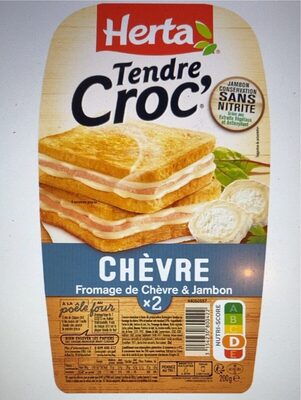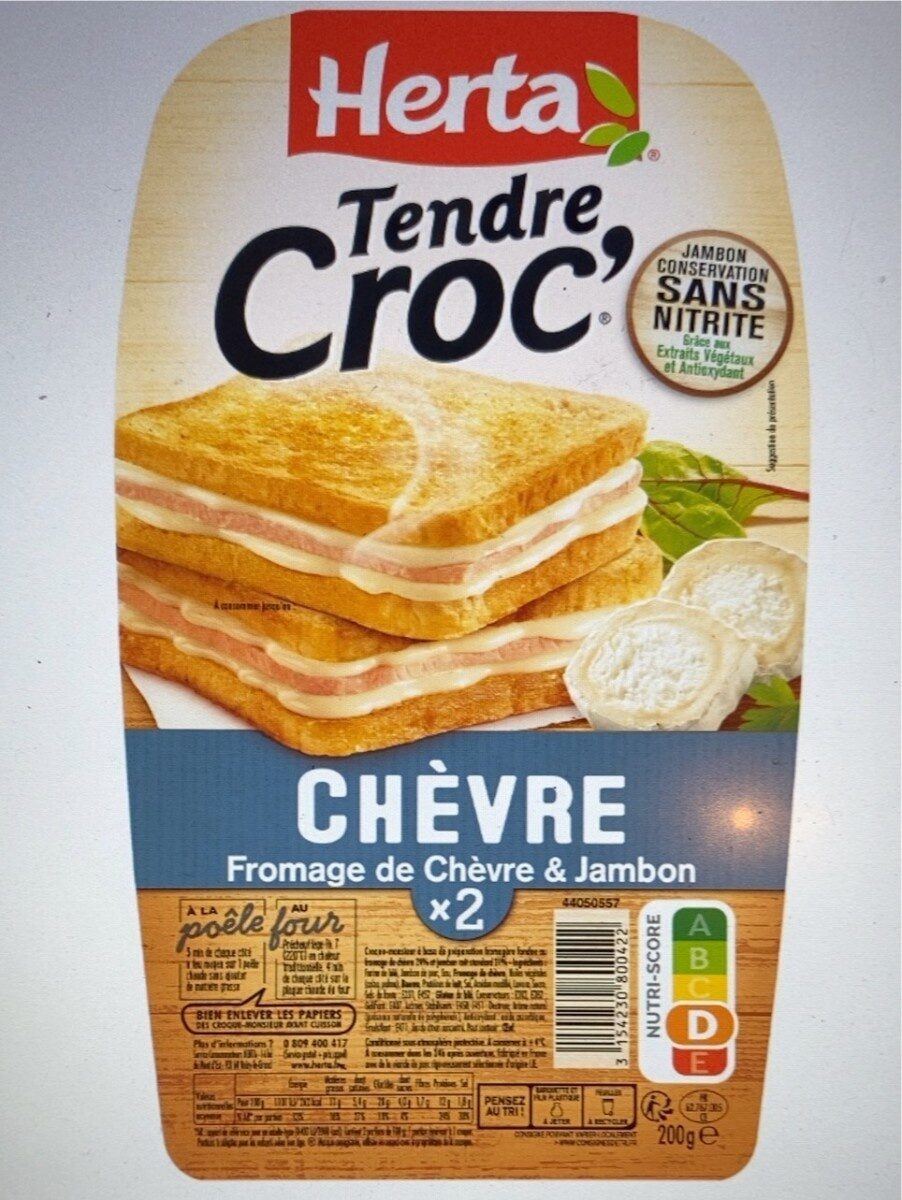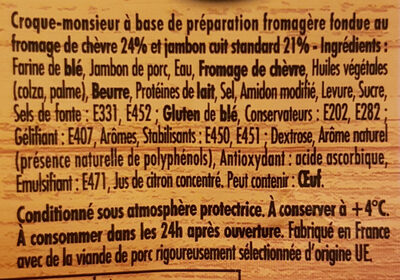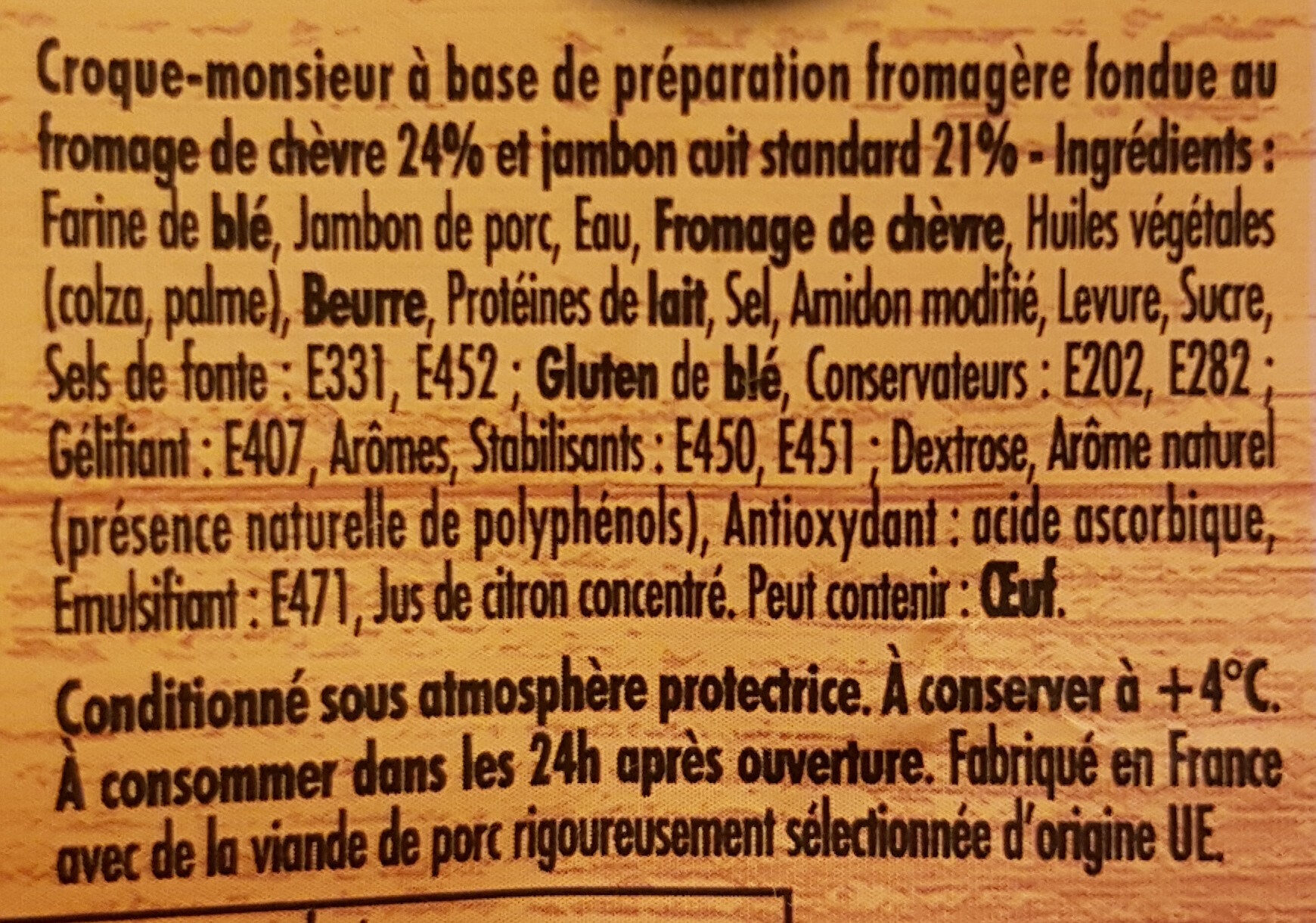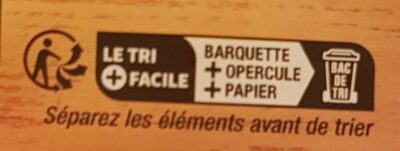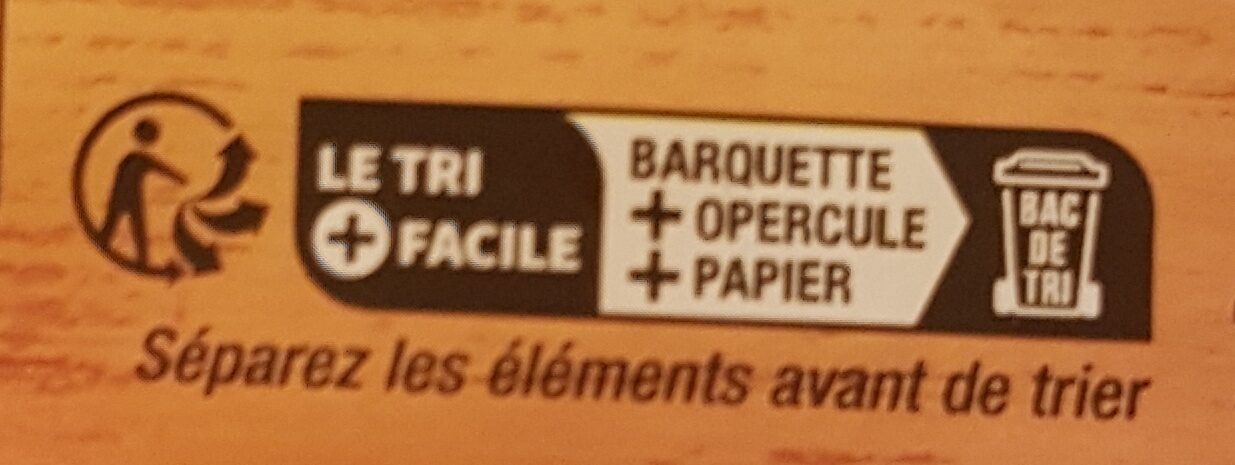Help us make food transparency the norm!
As a non-profit organization, we depend on your donations to continue informing consumers around the world about what they eat.
The food revolution starts with you!
Tendre Croc' Chèvre - Herta - 200 g e
Tendre Croc' Chèvre - Herta - 200 g e
Barcode: 3154230800422 (EAN / EAN-13)
Quantity: 200 g e
Brands: Herta
Categories: Meals, Sandwiches, Grilled cheese & ham sandwich prepacked, Toasted ham sandwich topped with grated cheese
Labels, certifications, awards:
Made in France, Nutriscore, Nutriscore Grade D, Without sodium nitrite, Triman, Jambon-sans-nitrite
Origin of ingredients: Porc origine UE
Manufacturing or processing places: France
Traceability code: FR 62.767.005 CE - Saint-Pol-sur-Ternoise (Pas-de-Calais, France)
Link to the product page on the official site of the producer: http://www.herta.fr
Stores: E.leclerc, Carrefour, Carrefour Market, Auchan
Countries where sold: France
Matching with your preferences
Health
Ingredients
-
32 ingredients
: Farine de blé, jambon de porc, eau, fromage de chèvre, huiles végétales (colza, palme), beurre, protéines de lait, sel, amidon modifié, levure, sucre, sels de fonte : E331, E452 ; gluten de blé, conservateurs : E202, E282 ; gélifiant : E407, arômes, stabilisants: E450, E451 ; dextrose, arôme naturel (présence naturelle de polyphénols), antioxydant : acide ascorbique, émulsifiant: E471, jus de citron concentré.Allergens: Gluten, MilkTraces: Eggs, En-eggs
Food processing
-
Ultra processed foods
Elements that indicate the product is in the 4 - Ultra processed food and drink products group:
- Additive: E14XX - Modified Starch
- Additive: E407 - Carrageenan
- Additive: E450 - Diphosphates
- Additive: E451 - Triphosphates
- Additive: E452 - Polyphosphates
- Additive: E471 - Mono- and diglycerides of fatty acids
- Ingredient: Dextrose
- Ingredient: Emulsifier
- Ingredient: Flavouring
- Ingredient: Gelling agent
- Ingredient: Glucose
- Ingredient: Gluten
- Ingredient: Milk proteins
Food products are classified into 4 groups according to their degree of processing:
- Unprocessed or minimally processed foods
- Processed culinary ingredients
- Processed foods
- Ultra processed foods
The determination of the group is based on the category of the product and on the ingredients it contains.
Additives
-
E202 - Potassium sorbate
Potassium sorbate (E202) is a synthetic food preservative commonly used to extend the shelf life of various food products.
It works by inhibiting the growth of molds, yeast, and some bacteria, preventing spoilage. When added to foods, it helps maintain their freshness and quality.
Some studies have shown that when combined with nitrites, potassium sorbate have genotoxic activity in vitro. However, potassium sorbate is generally recognized as safe (GRAS) by regulatory authorities.
-
E282 - Calcium propionate
Calcium propanoate: Calcium propanoate or calcium propionate has the formula Ca-C2H5COO-2. It is the calcium salt of propanoic acid.Source: Wikipedia
-
E331 - Sodium citrates
Sodium citrate: Sodium citrate may refer to any of the sodium salts of citrate -though most commonly the third-: Monosodium citrate Disodium citrate Trisodium citrateThe three forms of the salt are collectively known by the E number E331. Sodium citrates are used as acidity regulators in food and drinks, and also as emulsifiers for oils. They enable cheeses to melt without becoming greasy.Source: Wikipedia
-
E407 - Carrageenan
Carrageenan (E407), derived from red seaweed, is widely employed in the food industry as a gelling, thickening, and stabilizing agent, notably in dairy and meat products.
It can exist in various forms, each imparting distinct textural properties to food.
However, its degraded form, often referred to as poligeenan, has raised health concerns due to its potential inflammatory effects and its classification as a possible human carcinogen (Group 2B) by the International Agency for Research on Cancer (IARC).
Nevertheless, food-grade carrageenan has been deemed safe by various regulatory bodies when consumed in amounts typically found in food.
-
E450 - Diphosphates
Diphosphates (E450) are food additives often utilized to modify the texture of products, acting as leavening agents in baking and preventing the coagulation of canned food.
These salts can stabilize whipped cream and are also found in powdered products to maintain their flow properties. They are commonly present in baked goods, processed meats, and soft drinks.
Derived from phosphoric acid, they're part of our daily phosphate intake, which often surpasses recommended levels due to the prevalence of phosphates in processed foods and drinks.
Excessive phosphate consumption is linked to health issues, such as impaired kidney function and weakened bone health. Though diphosphates are generally regarded as safe when consumed within established acceptable daily intakes, it's imperative to monitor overall phosphate consumption to maintain optimal health.
-
E451 - Triphosphates
Sodium triphosphate: Sodium triphosphate -STP-, also sodium tripolyphosphate -STPP-, or tripolyphosphate -TPP-,- is an inorganic compound with formula Na5P3O10. It is the sodium salt of the polyphosphate penta-anion, which is the conjugate base of triphosphoric acid. It is produced on a large scale as a component of many domestic and industrial products, especially detergents. Environmental problems associated with eutrophication are attributed to its widespread use.Source: Wikipedia
-
E471 - Mono- and diglycerides of fatty acids
Mono- and diglycerides of fatty acids (E471), are food additives commonly used as emulsifiers in various processed foods.
These compounds consist of glycerol molecules linked to one or two fatty acid chains, which help stabilize and blend water and oil-based ingredients. E471 enhances the texture and shelf life of products like margarine, baked goods, and ice cream, ensuring a smooth and consistent texture.
It is generally considered safe for consumption within established regulatory limits.
Ingredients analysis
-
Palm oil
Ingredients that contain palm oil: Palm oil
-
Non-vegan
Non-vegan ingredients: Ham, Goat cheese, Butter, Milk proteins
-
Non-vegetarian
Non-vegetarian ingredients: Ham
-
Details of the analysis of the ingredients
: Farine de _blé_, jambon de porc, eau, _fromage_ de chèvre, huiles végétales de colza, huiles végétales de palme, _beurre_, protéines de _lait_, sel, amidon modifié, levure, sucre, sels de fonte (e331), e452, _gluten_ de _blé_, conservateurs (e202), e282, gélifiant (e407), arômes, stabilisants (e450), e451, dextrose, arôme naturel (), antioxydant (acide ascorbique), émulsifiant (e471), jus de citron concentré- Farine de _blé_ -> en:wheat-flour - vegan: yes - vegetarian: yes - ciqual_proxy_food_code: 9410 - percent_min: 3.84615384615385 - percent_max: 100
- jambon de porc -> en:ham - vegan: no - vegetarian: no - ciqual_proxy_food_code: 28205 - percent_min: 0 - percent_max: 50
- eau -> en:water - vegan: yes - vegetarian: yes - ciqual_food_code: 18066 - percent_min: 0 - percent_max: 33.3333333333333
- _fromage_ de chèvre -> en:goat-cheese - vegan: no - vegetarian: maybe - ciqual_proxy_food_code: 12999 - percent_min: 0 - percent_max: 25
- huiles végétales de colza -> en:colza-oil - vegan: yes - vegetarian: yes - from_palm_oil: no - ciqual_food_code: 17130 - percent_min: 0 - percent_max: 20
- huiles végétales de palme -> en:palm-oil - vegan: yes - vegetarian: yes - from_palm_oil: yes - ciqual_food_code: 16129 - percent_min: 0 - percent_max: 16.6666666666667
- _beurre_ -> en:butter - vegan: no - vegetarian: yes - ciqual_proxy_food_code: 16400 - percent_min: 0 - percent_max: 14.2857142857143
- protéines de _lait_ -> en:milk-proteins - vegan: no - vegetarian: yes - percent_min: 0 - percent_max: 12.5
- sel -> en:salt - vegan: yes - vegetarian: yes - ciqual_food_code: 11058 - percent_min: 0 - percent_max: 1.6
- amidon modifié -> en:modified-starch - vegan: yes - vegetarian: yes - ciqual_proxy_food_code: 9510 - percent_min: 0 - percent_max: 1.6
- levure -> en:yeast - vegan: yes - vegetarian: yes - percent_min: 0 - percent_max: 1.6
- sucre -> en:sugar - vegan: yes - vegetarian: yes - ciqual_proxy_food_code: 31016 - percent_min: 0 - percent_max: 1.6
- sels de fonte -> en:emulsifying-salts - percent_min: 0 - percent_max: 1.6
- e331 -> en:e331 - vegan: yes - vegetarian: yes - percent_min: 0 - percent_max: 1.6
- e452 -> en:e452 - vegan: yes - vegetarian: yes - percent_min: 0 - percent_max: 1.6
- _gluten_ de _blé_ -> en:wheat-gluten - vegan: yes - vegetarian: yes - percent_min: 0 - percent_max: 1.6
- conservateurs -> en:preservative - percent_min: 0 - percent_max: 1.6
- e202 -> en:e202 - vegan: yes - vegetarian: yes - percent_min: 0 - percent_max: 1.6
- e282 -> en:e282 - vegan: yes - vegetarian: yes - percent_min: 0 - percent_max: 1.6
- gélifiant -> en:gelling-agent - percent_min: 0 - percent_max: 1.6
- e407 -> en:e407 - vegan: yes - vegetarian: yes - percent_min: 0 - percent_max: 1.6
- arômes -> en:flavouring - vegan: maybe - vegetarian: maybe - percent_min: 0 - percent_max: 1.6
- stabilisants -> en:stabiliser - percent_min: 0 - percent_max: 1.6
- e450 -> en:e450 - vegan: yes - vegetarian: yes - percent_min: 0 - percent_max: 1.6
- e451 -> en:e451 - vegan: yes - vegetarian: yes - percent_min: 0 - percent_max: 1.6
- dextrose -> en:dextrose - vegan: yes - vegetarian: yes - ciqual_proxy_food_code: 31016 - percent_min: 0 - percent_max: 1.6
- arôme naturel -> en:natural-flavouring - vegan: maybe - vegetarian: maybe - percent_min: 0 - percent_max: 0
- antioxydant -> en:antioxidant - percent_min: 0 - percent_max: 0
- acide ascorbique -> en:e300 - vegan: yes - vegetarian: yes - percent_min: 0 - percent_max: 0
- émulsifiant -> en:emulsifier - percent_min: 0 - percent_max: 0
- e471 -> en:e471 - vegan: maybe - vegetarian: maybe - from_palm_oil: maybe - percent_min: 0 - percent_max: 0
- jus de citron concentré -> en:concentrated-lemon-juice - vegan: yes - vegetarian: yes - ciqual_food_code: 2028 - percent_min: 0 - percent_max: 0
Nutrition
-
Poor nutritional quality
⚠ ️Warning: the amount of fruits, vegetables and nuts is not specified on the label, it was estimated from the list of ingredients: 3This product is not considered a beverage for the calculation of the Nutri-Score.
Positive points: 1
- Proteins: 5 / 5 (value: 13, rounded value: 13)
- Fiber: 1 / 5 (value: 1.7, rounded value: 1.7)
- Fruits, vegetables, nuts, and colza/walnut/olive oils: 0 / 5 (value: 3.00483061717107, rounded value: 3)
Negative points: 15
- Energy: 3 / 10 (value: 1118, rounded value: 1118)
- Sugars: 0 / 10 (value: 2.9, rounded value: 2.9)
- Saturated fat: 5 / 10 (value: 5.5, rounded value: 5.5)
- Sodium: 7 / 10 (value: 640, rounded value: 640)
The points for proteins are not counted because the negative points are greater or equal to 11.
Nutritional score: (15 - 1)
Nutri-Score:
-
Nutrient levels
-
Fat in moderate quantity (11%)
What you need to know- A high consumption of fat, especially saturated fats, can raise cholesterol, which increases the risk of heart diseases.
Recommendation: Limit the consumption of fat and saturated fat- Choose products with lower fat and saturated fat content.
-
Saturated fat in high quantity (5.5%)
What you need to know- A high consumption of fat, especially saturated fats, can raise cholesterol, which increases the risk of heart diseases.
Recommendation: Limit the consumption of fat and saturated fat- Choose products with lower fat and saturated fat content.
-
Sugars in low quantity (2.9%)
What you need to know- A high consumption of sugar can cause weight gain and tooth decay. It also augments the risk of type 2 diabetes and cardio-vascular diseases.
Recommendation: Limit the consumption of sugar and sugary drinks- Sugary drinks (such as sodas, fruit beverages, and fruit juices and nectars) should be limited as much as possible (no more than 1 glass a day).
- Choose products with lower sugar content and reduce the consumption of products with added sugars.
-
Salt in high quantity (1.6%)
What you need to know- A high consumption of salt (or sodium) can cause raised blood pressure, which can increase the risk of heart disease and stroke.
- Many people who have high blood pressure do not know it, as there are often no symptoms.
- Most people consume too much salt (on average 9 to 12 grams per day), around twice the recommended maximum level of intake.
Recommendation: Limit the consumption of salt and salted food- Reduce the quantity of salt used when cooking, and don't salt again at the table.
- Limit the consumption of salty snacks and choose products with lower salt content.
-
-
Nutrition facts
Nutrition facts As sold
for 100 g / 100 mlAs sold
per serving (290g)Compared to: Toasted ham sandwich topped with grated cheese Energy 1,118 kj
(266 kcal)3,240 kj
(771 kcal)+10% Fat 11 g 31.9 g +4% Saturated fat 5.5 g 15.9 g +3% Carbohydrates 28 g 81.2 g +12% Sugars 2.9 g 8.41 g -5% Fiber 1.7 g 4.93 g +2% Proteins 13 g 37.7 g +17% Salt 1.6 g 4.64 g +10% Fruits‚ vegetables‚ nuts and rapeseed‚ walnut and olive oils (estimate from ingredients list analysis) 3.005 % 3.005 %
Environment
-
Eco-Score D - High environmental impact
⚠ ️Select a country in order to include the full impact of transportation.The Eco-Score is an experimental score that summarizes the environmental impacts of food products.→ The Eco-Score was initially developped for France and it is being extended to other European countries. The Eco-Score formula is subject to change as it is regularly improved to make it more precise and better suited to each country.Life cycle analysis
-
Average impact of products of the same category: C (Score: 52/100)
Category: Toasted ham sandwich topped with grated cheese
Category: Toasted ham sandwich topped with grated cheese
- PEF environmental score: 0.52 (the lower the score, the lower the impact)
- including impact on climate change: 4.42 kg CO2 eq/kg of product
Stage Impact Agriculture
75.9 %Processing
13.0 %Packaging
5.7 %Transportation
3.1 %Distribution
1.8 %Consumption
0.5 %
Bonuses and maluses
-
Missing origins of ingredients information
Malus: -5
⚠ ️ The origins of the ingredients of this product are not indicated.
If they are indicated on the packaging, you can modify the product sheet and add them.
If you are the manufacturer of this product, you can send us the information with our free platform for producers.
-
Ingredients that threatens species
Malus: -10
Contains palm oil
Tropical forests in Asia, Africa and Latin America are destroyed to create and expand oil palm tree plantations. The deforestation contributes to climate change, and it endangers species such as the orangutan, the pigmy elephant and the Sumatran rhino.
-
Packaging with a medium impact
Malus: -11
Shape Material Recycling Impact 1 Tray Plastic Recycle in sorting bin High 1 Seal Plastic Recycle in sorting bin High 4 Sheet Paper Recycle in sorting bin Low
Eco-Score for this product
-
Impact for this product: D (Score: 26/100)
Product: Tendre Croc' Chèvre - Herta - 200 g e
Life cycle analysis score: 52
Sum of bonuses and maluses: -26
Final score: 26/100
-
Carbon footprint
-
Equal to driving 2.3 km in a petrol car
442 g CO² per 100g of product
The carbon emission figure comes from ADEME's Agribalyse database, for the category: Toasted ham sandwich topped with grated cheese (Source: ADEME Agribalyse Database)
Stage Impact Agriculture
77.4 %Processing
8.1 %Packaging
8.8 %Transportation
4.7 %Distribution
0.8 %Consumption
0.2 %
Packaging
-
Packaging with a medium impact
-
Packaging parts
1 x Tray 200 g (Plastic: 15 g)
1 x Seal (Plastic: 3 g)
4 x Sheet (Paper)
-
Packaging materials
Material % Packaging weight Packaging weight per 100 g of product Paper or cardboard Plastic 100% 18 g 9 g Total 100% 18 g 9 g
-
Transportation
-
Origins of ingredients
Missing origins of ingredients information
⚠ ️ The origins of the ingredients of this product are not indicated.
If they are indicated on the packaging, you can modify the product sheet and add them.
If you are the manufacturer of this product, you can send us the information with our free platform for producers.Add the origins of ingredients for this product Add the origins of ingredients for this product
Threatened species
-
Contains palm oil
Drives deforestation and threatens species such as the orangutan
Tropical forests in Asia, Africa and Latin America are destroyed to create and expand oil palm tree plantations. The deforestation contributes to climate change, and it endangers species such as the orangutan, the pigmy elephant and the Sumatran rhino.
Report a problem
-
Incomplete or incorrect information?
Category, labels, ingredients, allergens, nutritional information, photos etc.
If the information does not match the information on the packaging, please complete or correct it. Open Food Facts is a collaborative database, and every contribution is useful for all.
Data sources
Product added on by kiliweb
Last edit of product page on by fgouget.
Product page also edited by additives-app-chakib, dorado-jerome, driveoff, ecoscore-impact-estimator, openfoodfacts-contributors, roboto-app, teolemon, yuka.sY2b0xO6T85zoF3NwEKvlnNsdfjckhX0Mhv4hBy14P2pM4TvTY5Iy9PRLqs.
